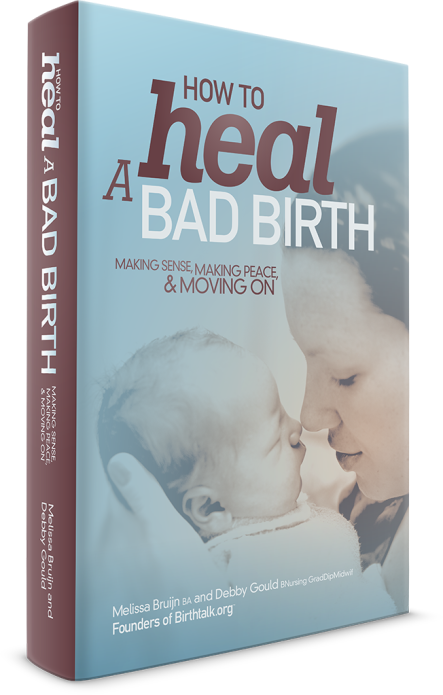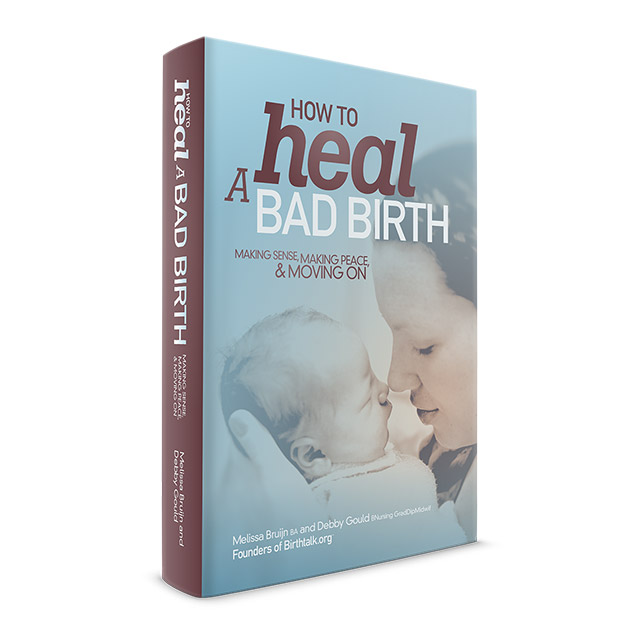
I was completely devastated. I felt like I had failed to go into labour naturally and, while having resisted some interventions, did not achieve the peaceful, calm, un-injured birth I wanted, and had now failed to exclusively breastfeed my child. Rosemary
I felt like such a bad mother – every other baby in the ward was calmly asleep next to their mother, and mine was just screaming his lungs out till he was too tired to scream any more. I really started to question if they had given me the wrong child. It made my feeling of being useless so much worse because I couldn’t even give birth to my child like everyone else, and now I couldn’t even feed him. Kristie
Welcome to the second part of our exploration of breastfeeding after a traumatic birth. As we say in Part One, there are many reasons why it can be so hard to breastfeed after a traumatic birth, and none of them are the mother’s fault. Many of the challenges are strongly related to the situation, rather than to the woman’s actual ability. It is the situation that has compromised the hormones a woman’s body requires to promote breastfeeding, and this is not the woman’s fault.
Failure and dogged determination
Failure is the most common word we hear at Birthtalk surrounding breastfeeding after a traumatic birth. Many women already often see themselves as having failed at birth, and then if breastfeeding does not work out, it becomes a double blow. They might feel compounding grief or anger that the circumstances surrounding their birth put them in this situation. Additionally, women often see their breastfeeding difficulties as another sign that their body doesn’t work, and can spiral further into feelings of despair and confusion. It can even affect how a woman sees herself as a mother.
When I walked in the doors of the lactation consultant’s office I burst into tears and explained that I was sure I was a failure as a mother. I mean, I couldn’t give birth without surgery and now I couldn’t breastfeed. How could I be a good mother? Skye
Often, this perceived failure at birthing is channelled into a fierce and dogged determination to salvage some remnants of control over a vastly out-of-control birthing experience, and to ‘succeed’ at breastfeeding. Professor Cheryl Beck and Sue Watson, in their study of the impact of birth trauma on breastfeeding, report that part of some mothers’ tenacity to succeed at breastfeeding was due to their need to prove themselves as mothers.(1) They also reported an unyielding resolve in some mothers to make atonement to their babies, to ‘make up’ for the birth.(2)
I felt like everything else had gone so very, very wrong, that maybe I could do this one thing. And it was excruciating; I was punch-drunk. I was exhausted and failing at feeding my child. Everyone around me, from my husband to my mother to the lactation consultant were all telling me that it was okay to stop. It wasn’t though; I could not stop. I NEEDED to feed my child from my body, I needed to salvage that one thing, and it was going terribly. Megan
While this is an understandable response, it increases the chances that the woman will feel more failure, if breastfeeding does not establish in spite of her determination. This is especially difficult if she hears about other women who voice similar determination after a traumatic birth, and are ultimately able to breastfeed. She may wonder : was she not determined enough, did she not try hard enough, and is her body just that much more of a failure. Which is such a difficult position to be in, and of course, untrue.
You did not fail – and here’s why
A delayed onset of lactation is defined as having more than 72 hours between the birth and when copious milk is secreted*.(3) Most women are not aware that having a caesarean, psychological stress or pain, or a stressful labour and delivery, or even a delayed first breastfeed are known risk factors for this delayed onset of lactation.(4) One recent study found that “mothers who received labor pain medications were more likely to report a delay in the onset of lactation, regardless of delivery method”.(5)
As we say in Part One : this is absolutely NOT a judgement about any decision to have pain relief, or a caesarean, or if you were feeling stressed; it is just an explanation of how it can impact on breastfeeding, to help you understand reasons why breastfeeding may have been difficult – reasons that nobody may have mentioned to you before now. If a woman is struggling, for example, because her milk hasn’t yet ‘come in’, she is rarely told of the possible link between this and aspects of her birth, so unfortunately, women often see themselves as failing. However, really, they are often in a situation where it is very challenging to initiate and sustain breastfeeding, through no fault of their own.
(It is also important to know that this does not mean that you cannot choose pain relief in future births. Being fully informed and aware of the possible hormonal challenges means you can create more options. You can take steps as part of your postnatal plan to stimulate those hormones in other ways, to promote a more optimal breastfeeding environment should you require pain relief medication.)
Hormonal challenges
In Part One of this blogpost, we explored the certain combination of hormones necessary for a normal, vaginal birth and for solid bonding to occur. We talked about how a similar hormonal mix also provides the optimal situation for breastfeeding to establish.
Dr Sarah Buckley notes there is an “elaborate interplay between these hormones of labour, birth and breastfeeding”(6). Dr Buckley explains that labour and birth involve the hormones oxytocin and prolactin at peak levels. Oxytocin is known as the hormone of love, while prolactin is the major hormone of breast-milk synthesis, and is known as the ‘mothering hormone’. Another hormone of labour and birth, beta-endorphin, helps the body release prolactin, and plays a role in bonding.(7)
In Part One we looked at a number of ways that this delicate interplay of hormones can be interfered with that can impact on breastfeeding, including :
- The emotional fallout from a traumatic birth
- A lack of optimal hormonal support due to
- pharmacological intervention
- having a caesarean, or instrumental birth
- stress during labour and delivery
After looking at some of the research, we suggested that any birth where there are significant levels of stress has the potential to send the delicate balance of hormones into disarray, and upset the perfect environment for mother and baby to initiate a healthy breastfeeding relationship.
Any birth where there are significant levels of stress has the potential to send the delicate balance of hormones into disarray, and upset the perfect environment for mother and baby to initiate a healthy breastfeeding relationship. Birthtalk.org
Rough handling
Postnatally, one highly stressful situation can be the initial stages of learning to breastfeed. How a woman’s body is handled by those around her as she develops her breastfeeding relationship with her baby is important.
Even after a positive birthing experience, it can be very difficult to accept strangers grabbing your breasts, shoving a baby’s head onto your nipple, and poking and handling these (usually) private parts of your body. This is even more relevant if you have just undergone a birth experience where you felt a strong sense of powerlessness, loss of dignity and the feeling that your body was not your own. As Professor Beck and Sue Watson describe in their study on the impact of birth trauma on breastfeeding, mother’s breasts become “just one more thing to be violated”.(8)
They came to ‘try and help me attach her’ which amounted to watching her failing to latch, and then rushedly trying to forcefully make her attach by pushing her head onto the breast. The forceful, hands-on approach of the midwives wasn’t working and was upsetting both of us, but I didn’t know what else to do. Rosemary
During that admission [re-admission for jaundice] I had many more frustrating encounters with different opinions and approaches to feeding, many of which I now know were simply wrong (e.g. more than one nurse pushing my baby’s head onto my breast while she cried!). Emm
Some birth workers can, unfortunately, be less-than-gentle in their handling of a woman’s breasts when trying to teach breastfeeding. When a woman has had a traumatic birth, is in a lot of pain from the breastfeeding process or as a result of the birth and is possibly feeling helpless and vulnerable as she recovers, then this invasion of her person can elicit severe anxiety and distress. The release of both oxytocin and prolactin is inhibited by stress,(9) so a stressed mother who is feeling poked and prodded and roughly handled (thus raising her stress levels) is not in an ideal situation for breastfeeding. This, again, is not the mother’s fault.
Support from partner and family
There also may be a lack of support from the woman’s partner or family, which can further exacerbate her chances of being able to breastfeed. The woman’s perception of her partner’s attitude towards breastfeeding can impact the initiation and duration of breastfeeding.(10)
Even if her partner is supportive of breastfeeding, if they do not understand the possible emotional impact from a traumatic birth, then they may not respond appropriately to her needs. If the woman is feeling unheard, confused, in shock, or even violated, then she may need support for this, before she can feel ready and comfortable to tackle breastfeeding.
Even if her partner is supportive of breastfeeding, if they do not understand the possible emotional impact from a traumatic birth, then they may not respond appropriately to her needs. Birthtalk.org
A focus on breastfeeding without addressing the fall-out from the birth can add to the woman feeling unimportant and distressed, which can impact on her hormonal levels, which can then also impact on her breastfeeding. This may leave her feeling further isolated and with less support for her breastfeeding as often partners, family or friends may believe the emotional fall out they are seeing is from breastfeeding, not the birth, and they may suggest that stopping breastfeeding is the answer, which often it is not.
We do not blame partners for being unable to offer support for a traumatic birth. We know that they, like most people in our culture, are unaware of the implications of a traumatic birth, or how to help. Usually, there is no one offering information to the couple that encourages understanding of the fall out of a traumatic birth.
Forgiveness and new understanding
Whether you were ultimately able to continue breastfeeding, or needed to move on to other forms of feeding, it can be helpful to understand why it was such a challenging process. We hope this understanding might help to take the pressure off you, and also give you some insights and confidence for planning for breastfeeding future babies.
We would like to finish with a quote from Becky, who experienced many breastfeeding challenges in her journey :
I know first-hand how society does not encourage breastfeeding. I know first-hand how little support there is. I know first-hand how much support is needed. I know first-hand the myriad of challenges one can face. I know first-hand that every mother feeds her baby with love, be it from her breast, her milk in a bottle, or formula in a bottle. Becky
Go gently with yourself, knowing that you are not alone. The healing journey might hard, but so worthwhile. We are right here with you as you heal.
_______________
*We want to point out here that a delay in the onset of lactation may not mean that something is wrong. Deb from Birthtalk had a personal breastfeeding journey that included an experience with her second child where, after a positive, undisturbed water birth, breastfeeding on (high!) demand, her milk took much longer than 72 hours to come in. With excellent support from her private midwife and a thriving baby, Deb worked through this challenging situation and went on to feed her daughter into toddlerhood.
©2016 Birthtalk.org
Adapted from our book, How to Heal a Bad Birth : making sense, making peace and moving on.
- Tatano Beck, C., & Watson, S. (2008). Impact of Birth Trauma on Breast-feeding: A Tale of Two Pathways. Nursing Research, 57(4), 228–236.
- ibid.
- Lind, J.N., Perrine, C.G., & Li, R. (2014). Relationship between use of labor pain medications and delayed onset of lactation. Journal of Human Lactation, 30(2), 167–73
- ibid.
- ibid.
- Buckley, S. (2005) Pain in Labour: your hormones are your helpers. (An article & eBook). Retrieved from http://sarahbuckley.com/pain‐in‐labour‐your‐hormones‐are‐your‐helpers, accessed July 2014.
- ibid.
- Tatano Beck, C., & Watson, S. (2008). Impact of Birth Trauma on Breast-feeding: A Tale of Two Pathways. Nursing Research, 57(4), 228–236.
- Nissen, E., Uvnas-Moberg, K., Svensson, K., Stock, S., Widstrom, A.M., & Winberg, J. (1996). Different patterns of oxytocin, pro-lactin but not cortisol release during breastfeeding in women delivered by caesarean section or by the vaginal route. Early Human Development, 45(1–2), 103–118.
- ibid.

